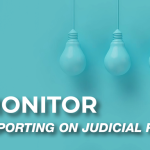28/06/2013 Collected books delivered to prison for women
28/06/20131/07/2013 U.S. Embassy Awards Grants to Criminal Justice Civil Society Organizations
01/07/201330/06/2013 On the Draft law on amendments to the Criminal Code
Human Rights Action particularly commends the acceptance of our proposal to the Draft law on amendments to the Criminal Code to add exceptions for punishment when actions are taken in public interest, with the aim to indicate criminal offenses, in relation to punishment for criminal offences Infringement of privacy of mail, Unauthorized wiretapping and recording, Unauthorized photographing, Unauthorized publication and presentation of a somebody else’s written texts, portraits and recordings and Unauthorized collection of personal data. This amendment to the Law is particularly positive for the so-called investigative journalism.
However, last week, Human Rights Action appealed to the Ministry of Justice and the MPs groups to consider our proposals for seven amendments to the Draft law on amendments to the Criminal Code, with the aim to ensure its complete and long-term compliance with international standards and recommendations, as well as Constitutional guarantees. These proposals are known to the proposer of the Law from before.
We proposed:
1) increase the minimum and maximum penalties for the crimes of Abuse and Torture, in accordance with the recommendations of the UN Human Rights Committee. We observed that the existing penal policy, which has the tendency to mitigate penalties below the already low legal minimum, to impose probation (forgiveness) for proven abuse and torture by state agents (police and prison officers), is not in line with international standards (see the report “Prosecution of Torture and Ill-Treatment in Montenegro”, Human Rights Action, March 2013). Therefore, we consider that prescribing more strict punishments would result in changes to the current penal policy. Also, an increase in the maximum penalty would result in the increase of limitation period for the prosecution of these offenses, in accordance with the recommendations of the UN Committee.
2) decriminalization (abolishment) of the remaining offenses under Chapter XVII of the Criminal Code (offenses against honour and reputation), with the aim of logical completion of decriminalization of Defamation and Libel. The remaining offenses (Spreading information about private and family life, Violation of the reputation of Montenegro, Violation of the reputation of a foreign state or an international organization, Violation of the reputation of people, national minorities or ethnic groups, Violation of the reputation of a foreign state or an international organization) are a special kind of Defamation and Libel: the last three offenses are prosecuted ex officio, and for the Violation of the reputation of Montenegro a prison sentence is still prescribed. Particularly absurd is the offense Violation of the reputation of a foreign state or an international organization, which protects the reputation of only those states with which Montenegro has diplomatic relations, or reputation of only those organizations that Montenegro is a member of. All these offenses represent a potential threat to the freedom of expression.
3) prescribing new criminal offenses Prevention of journalists in the performance of professional duties and Assault on journalists in performing professional duties with the aim to improve the protection of journalists in the performance of professional duties in order to act in prevention and thus discourage assaults on journalists due to their activities of informing the public, of special public interest.
4) prescribing a new offense Violation of the freedom of expression of gender identity and sexual orientation, which would punish violations of the freedom of expression, and for the forcible declaration on gender identity and sexual orientation (the proposal refers to the existing criminal offense Violation of the freedom of expression of national or ethnic affiliation (Art. 160) and Infringement of freedom of confession of religion and performance of religious rites (Art. 161).
5-7) other proposals refer to the completion of decriminalization of hate crimes, amendments to Article 159 Violation of equality, amendments to Article 405 – Illegal border crossing and smuggling, and Article 446 – Submission to slavery and transportation of enslaved persons, in order to comply them with international standards.
Proposed amendments to the Criminal Code can be found in the appeal submitted to the Ministry of Justice and the MPs groups, available here.







 English
English